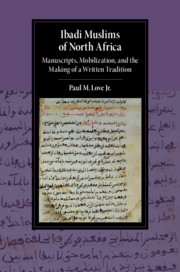
- Cited by 3
-
Cited byCrossref Citations
This Book has been cited by the following publications. This list is generated based on data provided by Crossref.
Love, Paul M. 2020. Manuscripts are like vampires: Libraries and their uncertain histories on the island of Jerba, Tunisia. History Compass, Vol. 18, Issue. 10,
Gaiser, Adam 2020. Ballaghanā ʿan an-Nabī: early Basran and Omani Ibāḍī understandings ofsunnaandsiyar,āthārandnasab. Bulletin of the School of Oriental and African Studies, Vol. 83, Issue. 3, p. 437.
Ould-Braham, Ouahmi 2024. Une source ibāḍite à phrases berbères : le siyar de Bughṭūrī (écrit en 599/1202-3). I. – Étude externe….. Études et Documents Berbères, Vol. N° 49, Issue. 1, p. 245.
- Publisher:
- Cambridge University Press
- Online publication date:
- September 2018
- Print publication year:
- 2018
- Online ISBN:
- 9781108560498


